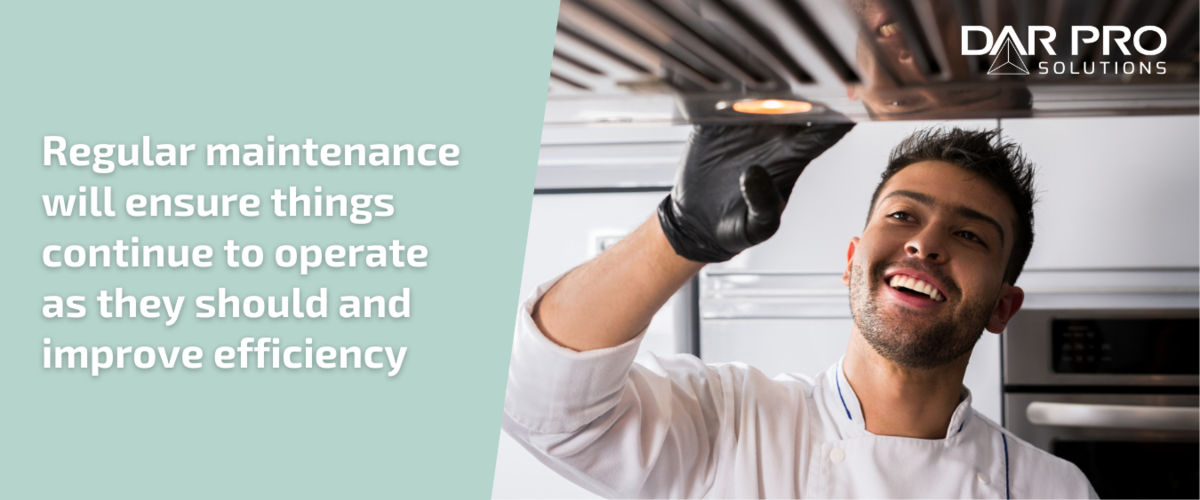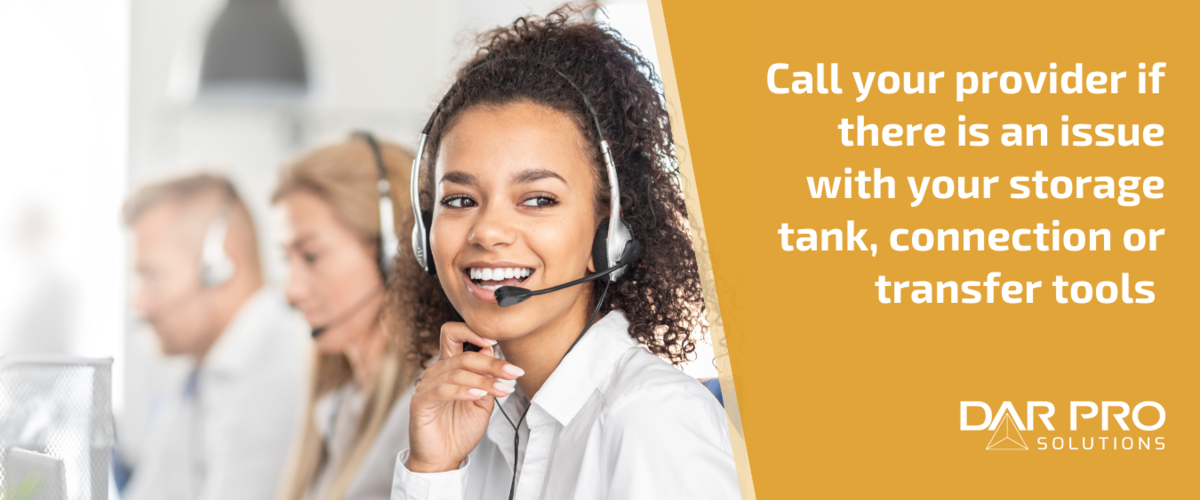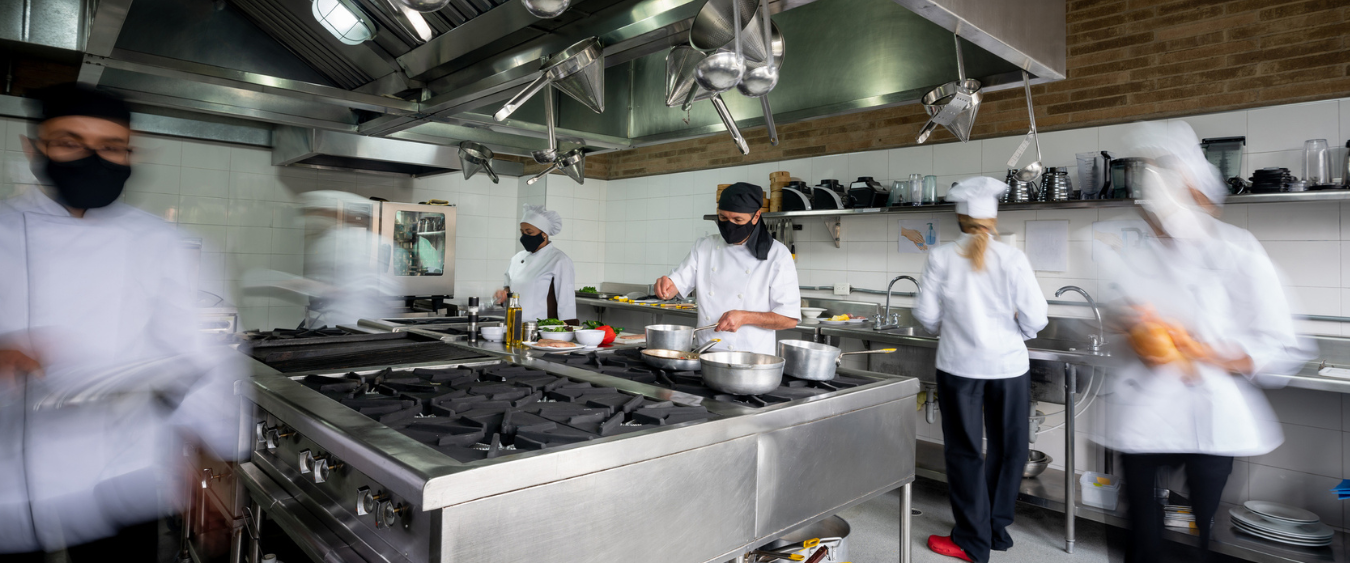
Maintaining Your Fryers and Grills
Your fryer and grill is where a good portion of your menu is created. Fryer maintenance and grill maintenance is key to your kitchen running smoothly. Keeping both clean and checking regularly to see if they are operating as intended will keep them functional for a longer period of time.
What to do and why it matters:
- Wipe down the fryer exterior and clean the fryer baskets. Your food touches both of these directly and it should remain clean.
- Filter the oil. Dirty oil leads to poor food quality and more frequently having to change frying oil.
- Replace oil regularly for best food quality and prevent debris from building up within the fryer.
- Do a weekly or bi-weekly deep clean of the fryer (a boil-out) or grill surface.
- Scrub fryer vats at least once per week.
If a more serious issue with your grill or fryer surfaces, promptly call the manufacturer to prevent a larger and more long-term issue is created.
Professional and Self-clean Your Ventilation System
Your ventilation system is a cleaning mechanism in its own right, and you should take care of it so it continues to operate as such. The vent system above a fryer or grill is designed to capture all of the smoke, steam, and grease-related vapors that are released during the frying and grilling process. The hood, vent, and duct should be cleaned regularly.
What to do and why it matters:
- Gets rid of the build-up that accumulates over time. This will keep it functioning most effectively.
- Have your staff clean the ventilation system once a week.
- Make sure the equipment is off before cleaning.
- Have a qualified contractor inspect at least twice per year.
As mentioned above, it is a good practice to have a professional clean your ventilation system twice a year. This is a job for a qualified contractor. In between, restaurant staff can be trained to clean the visible parts to prevent dirt from accumulating.
Check on Your Used Cooking Oil Recycling Equipment
Once your fryer has used that grease, it must go somewhere, and not having a functional storage option for your used cooking oil can become a major problem for your kitchen. An overflow or backup can prevent you from continuing to fry until the situation is resolved.
What to do and why it matters:
- Keep storage tank and transfer equipment clean to prevent build-up in fryer or transfer options.
- Ensure the tank remains free of debris. Used cooking oil is the only thing that should go in the tank.
- Debris causes problems within the tank and dilutes the quality of the oil.
- Check the tank’s heater, full-shutoff alarm, and connection valves to ensure they are functioning properly.
- Call your provider if there is an issue with your storage tank, connection, or transfer tools.
- If you have an outdoor container, keep the exterior and around it clean.
If a mechanical issue with the tank emerges, don’t try to fix it yourself. Call your used cooking oil service provider to handle the issue. It’s the safest and most efficient way to solve an issue with your storage tank.

Regularly Check on Your Refrigeration Equipment
A malfunctioning refrigerator or freezer is the quickest way to tarnish supplies that are essential to making your food for your customers. Regular check-ups and maintenance on your refrigeration equipment will save you major headaches in the long run.
What to do and why it matters:
- Make sure the temperature reading is at 40 degrees Fahrenheit or below each day.
- Wipe down shelves and the interior of the fridge and freezer weekly.
- Wipe down the exterior of the fridge and freezer weekly.
- Inspect all gaskets for any tears or holes.
- Clean the condenser and evaporator coils every 1-2 weeks to prevent build-up.
- Wipe down the fan blades every week.
- Test temperature controls every few months.
- Test icemaker and drink machine every week, particularly if customers use it.
Regular maintenance of your refrigeration systems will save your business problems down the road.
Fire Safety Equipment Maintenance Is a Must
Fire safety might not be something you think about until you have to, but it might be the most important aspect of your business when it comes to regular maintenance. It is best to be prepared should an emergency occur by making sure all the equipment you have in place is functional.
What to do and why it matters:
- Check the extinguishing system monthly to ensure it remains in good condition.
- The alarm system should be inspected by qualified personnel twice per year.
- Make sure fire alarms and smoke detectors are working regularly.
- Check the smoke detector battery once per month.
- Ensure emergency exits and alarms associated with them are functioning as they should.
Not having emergency equipment in place and fully functional is not only dangerous, but it can also leave you vulnerable to compensation claims and other litigation. For the safety of your staff and business, performing regular maintenance checks is a must.
Some General Best Practices for Restaurant Maintenance
You’ve now got an idea of areas to look for when it comes to restaurant equipment maintenance. Here are some general best practices to take with you to ensure all of these areas are regularly covered and tended to.
Things to know:
- For the maintenance piece you can control, create a regular schedule your staff abides by.
- Keep records of the warranty on each of your equipment.
- Be mindful of old equipment and be proactive in upgrading to new equipment when financially feasible.
- Train employees on how to properly use restaurant equipment.
- Make maintenance checks a part of your staff’s regular side work.
Regular maintenance on all of your equipment will make your business a safer place to work for your staff. It will help ensure your restaurant is functioning and profitable. Take these tips and organize your own maintenance schedule to keep your equipment in prime condition.
DAR PRO Solutions provides safe and efficient used cooking oil recycling solutions to over 130,000 commercial kitchens across the country. Our program reduces hazards within commercial kitchens. Reach out to a DAR PRO representative today and find out how your business can benefit from our program. Call us 24/7/365 at 855-DAR-PRO1 (855-327-7761).
Contact Sales
For customer service inquiries call our toll free number (855) 327-7761
By submitting this form I agree to the privacy policy including the usage of contact details to contact me for marketing purposes.
